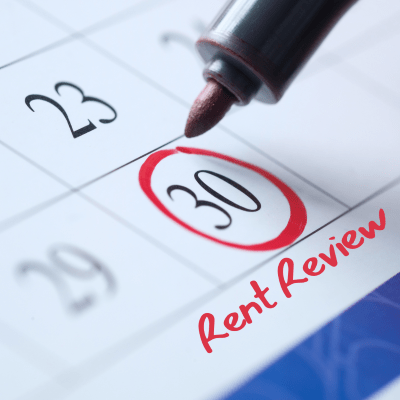The Commercial Lease Explainer: Rent Reviews

Rent is a key negotiating point, and can be impacted by other lease terms. How the rent is negotiated is part art, part science. Once the initial rent is agreed, landlords won’t want it to be fixed. If the lease lasts for five or more years, the landlord will want to be able to increase the rent.
How does the landlord do this? There are various options:
- Market Rent
This is the rent that could be obtained on the open market if the landlord were to market the property again and is called a “hypothetical lease”. This will involve revaluing the lease again to assess the level of rent. Parties will often negotiate on what exactly should be assumed and disregarded in the hypothetical lease.
Tenants should note that even if market rents have gone down, the lease provisions will almost always say that they cannot go down on review.
For example, the parties will usually assume the hypothetical lease will be on the same terms as the existing lease of the property, except it will only be for the remaining term of the lease. It will also be assumed that the old tenant has vacated the property.
The tenant may also want some changes to the property disregarded from the hypothetical lease. A tenant running a takeaway business may have invested time and money renovating the kitchen. The tenant who carried out works will not want to be charged more rent for improvements they made. This is why the tenant will usually ask to disregard such improvements from the hypothetical lease.
These are just some of the factors that will need to be considered when trying to revalue the property using the market rent method.
- Indexation
Instead of trying to revalue the property, the parties could instead link the rent to an index: Retail or Consumer Price Indices are most common. The objective is to link the rent review to inflation or the cost of living. A formula will often be set out to make it clear how the initial rent will change with the index on a rent review.
It is easier and simpler to calculate rent this way instead of trying to calculate the market rent, as there will be no need to revalue the property. This also means there will be less room for disagreement between the parties, especially if an expert is asked to deal with the calculation. However, linking the rent to inflation may mean that one of the parties is worse off depending on the speed the index increases. If the market value of the lease increases faster than inflation, the new rent calculated by an index will be smaller than it would have been on the open market, so the landlord will be missing out. If the value increases at a slower rather than inflation, then the tenant will be paying a rent that is higher than they could get elsewhere.
- A mix of 1 and 2 above.
The higher of market rent or indexation. This enables a landlord to hedge their bets and have the best of both worlds. Tenants will try to negotiate the lower of market rent or indexation.
- Caps and Collars
These operate to put a minimum and maximum on the increase in rents where indexation is used. For example, even if the index rockets, the tenant can be protected from a maximum rent figure. If the index does not increase, the landlord can stipulate a minimum increase.
- Fixed increases
These are often referred to as stepped rent where the rent increases by a fixed amount with no link to indexation or markets.
What if the landlord and tenant cannot agree on the new rent?
If the landlord and tenant cannot agree the right level on a review, review clauses allow the parties to instruct a surveyor to calculate the new rent.
Getting the rent and review right is crucial. Businesses can fail if they suddenly find they cannot pay the revised rent on review. Equally, landlords need to be able to adjust rent payments to keep in line with the market. Striking a fair balance is important for long-term success of the landlord and tenant relationship, and can help to avoid difficulties further down the line.
A rent review could have a huge impact on the value of the lease, and the provisions on rent review in a lease could itself affect its value! It is therefore vital that the parties agree the terms of a rent review before entering into a lease.
Follow our Commercial Property Explainer blogs and get completely in the know on commercial leases. And if you need expert legal advice in the meantime, call Thomas Connell on 01756 692 876 or email thomas.connell@awbclaw.co.uk.

25 April 2024
Further Reading:
The Commercial Lease Explainer: Heads of Terms
